Unit 9 Learning Lesson 3 课件(共31张,内嵌视频)2024-2025学年高一英语北师版(2019)必修第三册
文档属性
| 名称 | Unit 9 Learning Lesson 3 课件(共31张,内嵌视频)2024-2025学年高一英语北师版(2019)必修第三册 |
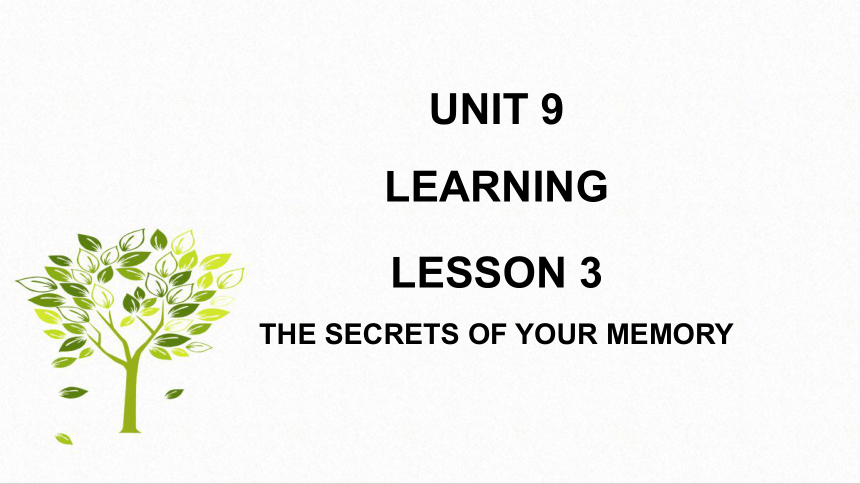
|
|
| 格式 | pptx | ||
| 文件大小 | 24.3MB | ||
| 资源类型 | 教案 | ||
| 版本资源 | 北师大版(2019) | ||
| 科目 | 英语 | ||
| 更新时间 | 2025-05-01 19:29:45 | ||
图片预览

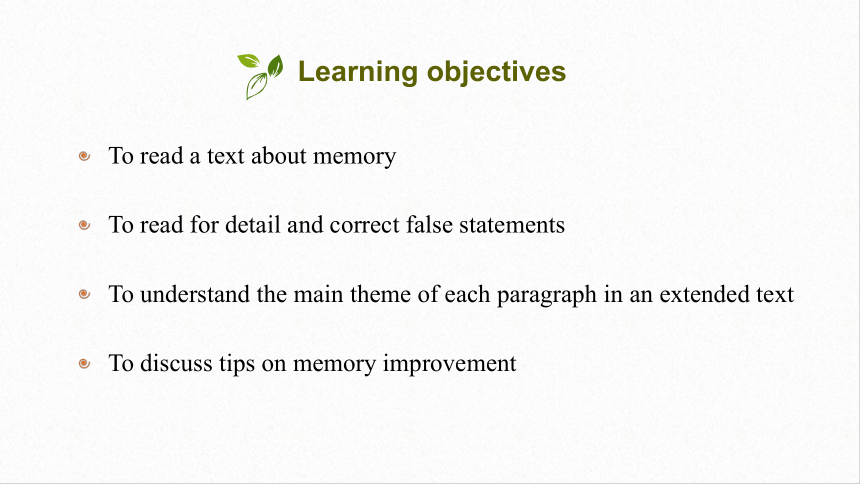
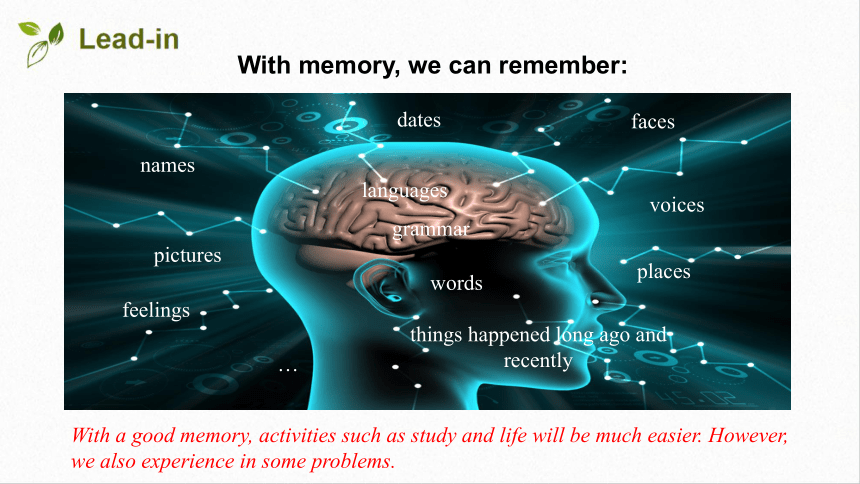
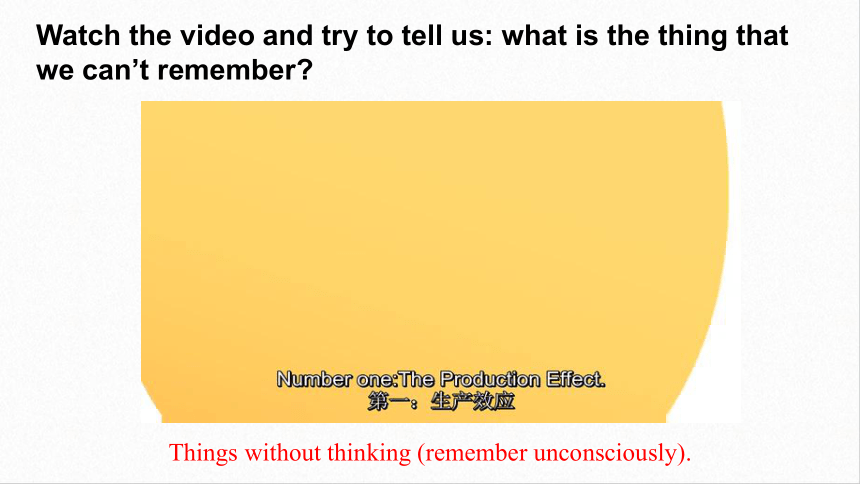
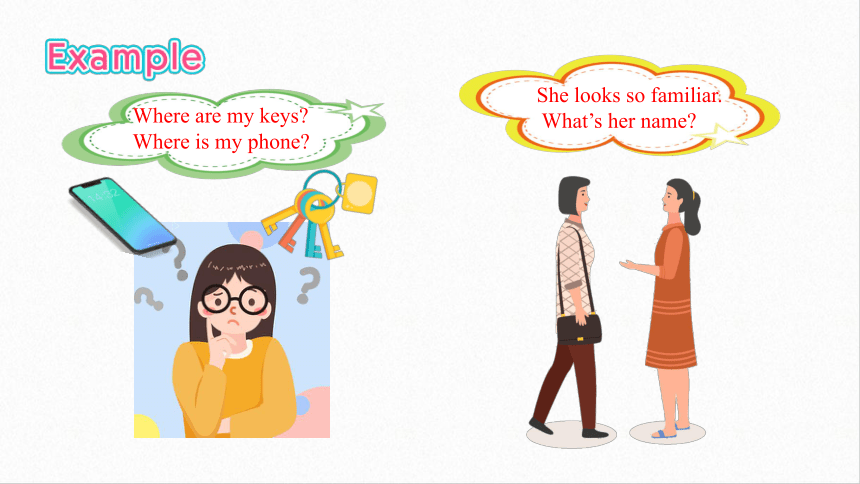
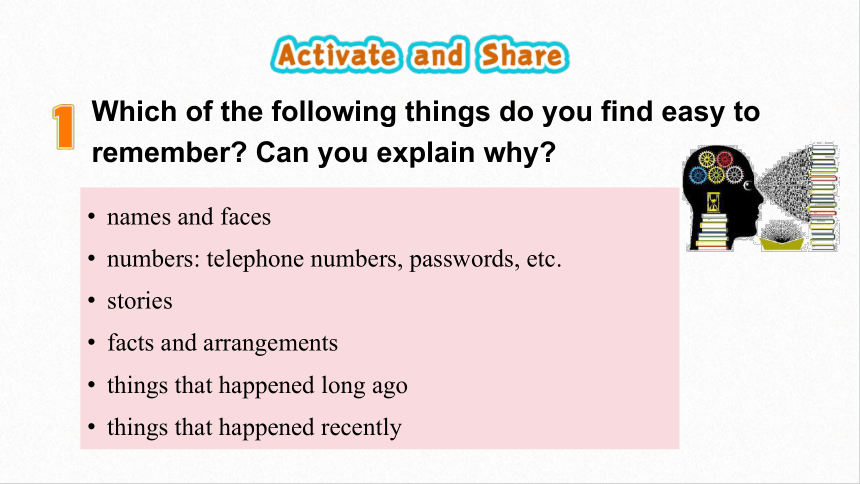
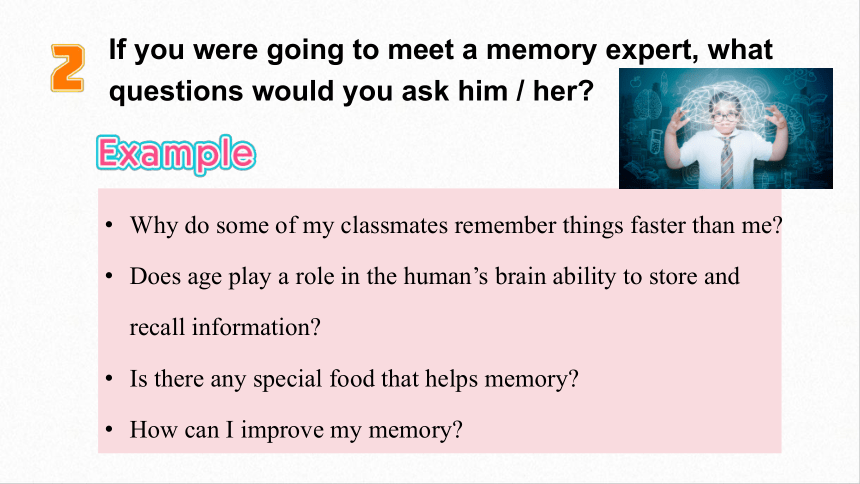
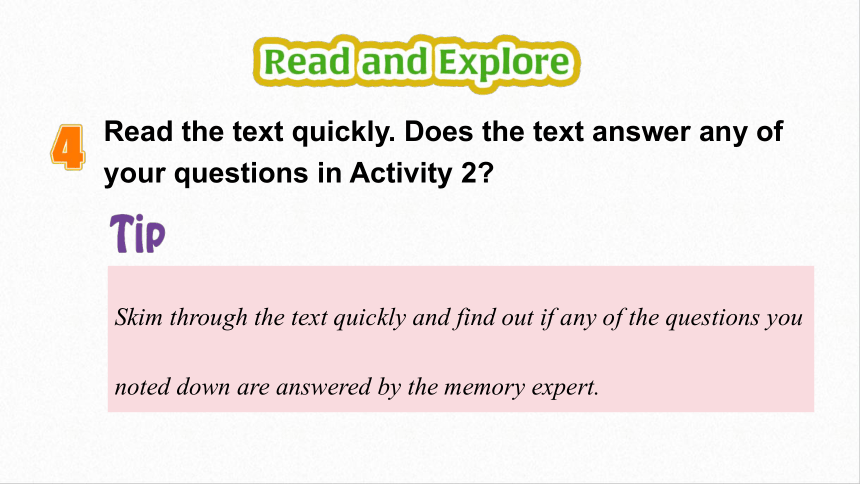
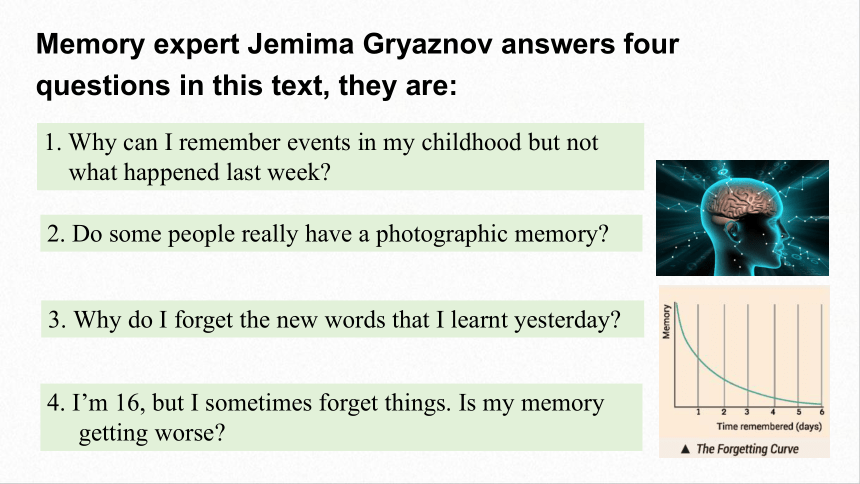
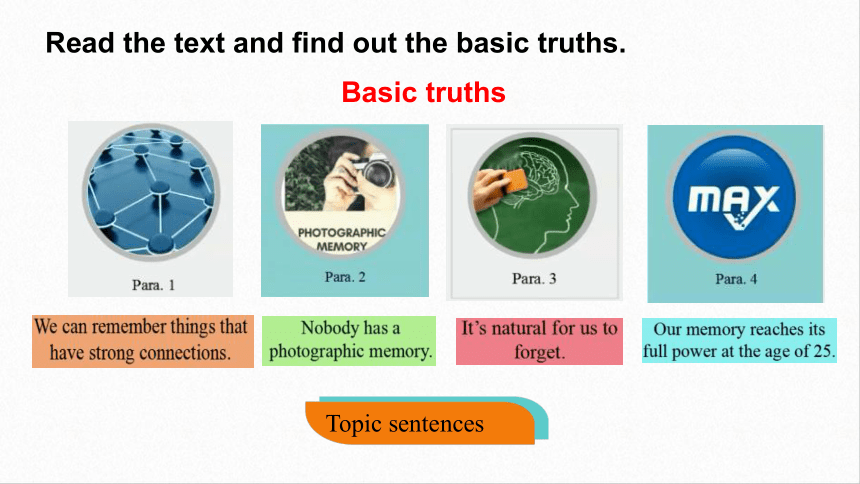
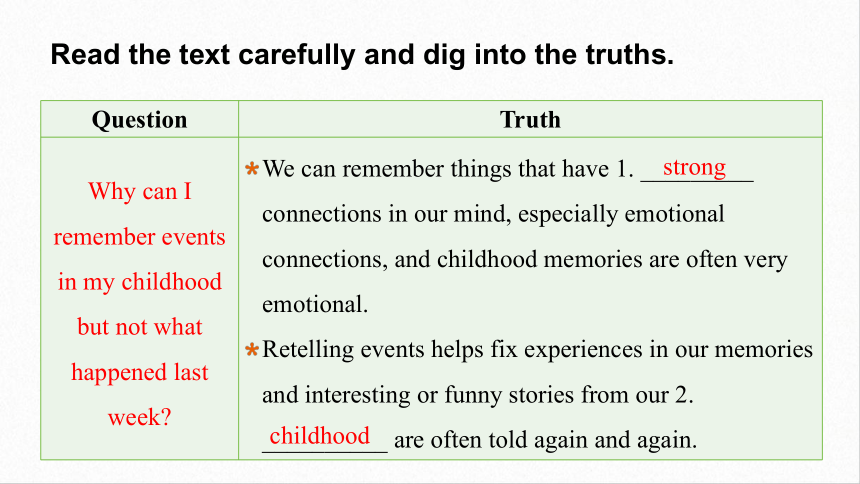
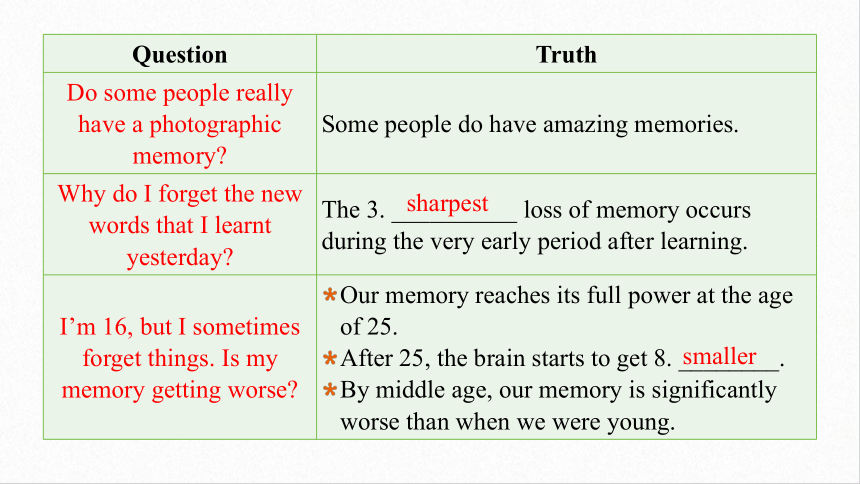
文档简介
(共31张PPT)
UNIT 9
LEARNING
LESSON 3
THE SECRETS OF YOUR MEMORY
To read a text about memory
To read for detail and correct false statements
To understand the main theme of each paragraph in an extended text
To discuss tips on memory improvement
Learning objectives
With memory, we can remember:
names
faces
dates
pictures
places
grammar
feelings
languages
words
voices
things happened long ago and recently
…
With a good memory, activities such as study and life will be much easier. However, we also experience in some problems.
Watch the video and try to tell us: what is the thing that we can’t remember
Things without thinking (remember unconsciously).
Where are my keys
Where is my phone
She looks so familiar.
What’s her name
Which of the following things do you find easy to remember Can you explain why
names and faces
numbers: telephone numbers, passwords, etc.
stories
facts and arrangements
things that happened long ago
things that happened recently
If you were going to meet a memory expert, what questions would you ask him / her
Why do some of my classmates remember things faster than me
Does age play a role in the human’s brain ability to store and recall information
Is there any special food that helps memory
How can I improve my memory
Read the text quickly. Does the text answer any of your questions in Activity 2
Skim through the text quickly and find out if any of the questions you noted down are answered by the memory expert.
Memory expert Jemima Gryaznov answers four questions in this text, they are:
1. Why can I remember events in my childhood but not what happened last week
2. Do some people really have a photographic memory
3. Why do I forget the new words that I learnt yesterday
4. I’m 16, but I sometimes forget things. Is my memory getting worse
Read the text and find out the basic truths.
Topic sentences
Basic truths
Read the text carefully and dig into the truths.
Question Truth
Why can I remember events in my childhood but not what happened last week We can remember things that have 1. _________ connections in our mind, especially emotional connections, and childhood memories are often very emotional.
Retelling events helps fix experiences in our memories and interesting or funny stories from our 2. __________ are often told again and again.
strong
childhood
Question Truth
Do some people really have a photographic memory Some people do have amazing memories.
Why do I forget the new words that I learnt yesterday The 3. __________ loss of memory occurs during the very early period after learning.
I’m 16, but I sometimes forget things. Is my memory getting worse Our memory reaches its full power at the age of 25.
After 25, the brain starts to get 8. ________.
By middle age, our memory is significantly worse than when we were young.
sharpest
smaller
Read the text again. Write T (true) or F (false). Correct the false statements.
We remember certain events in our childhood, because we experienced many of them for the first time, and we felt strongly about them at the time.
When we tell a story many times, we forget important details.
we can remember them clearly.
3. Stephen Wiltshire has a photographic memory because he can draw a detailed picture of a city from memory after flying over it.
He is good at remembering particular things but does not have a photographic memory.
4. It has been proved that some people have a photographic memory.
No one has been proved to have a photographic memory.
5. The sharpest loss of memory occurs during the first five days.
The sharpest loss of memory occurs during the very early period after learning.
Our memory starts to get worse after the age of 25.
6. Our memory starts to get worse in middle age.
What suggestions would you provide for each of the four questions discussed Discuss with your partner.
Read each paragraph in the text and discuss further advice that you would suggest.
Watch the video about Stephen Wiltshire and talk about his amazing memory.
Match the following suggestions with the four questions and put them back in the pare your suggestions with the expert's suggestions.
What can we learn from all this When remembering something new, try to connect it to our emotions. It is important to connect it with what we already know. Also, we can try to retell what we have learnt to a few others.
A
Therefore, one of the golden rules to increase how much we remember is to review the material periodically, especially during the first day after learning. This “spaced review” soon after learning helps build stronger memories and it is more effective than waiting to review everything before exams.
B
So take it easy. You are at a good age in terms of your memory. Make good use of it.
C
As most of us do not have amazing memories like them, when memorising detailed learning materials, we simply need to focus on the important ideas and be curious about what we learn. Asking questions about what we learn also helps with memorisation. Another effective technique to remember things is to group similar ideas or information together so that they can be easily connected to things that are already known.
D
What truths about memory does Jemima Gryaznov discuss in the text What advice does she give to improve one’s memory
Truth: We remember things that have strong connections in our mind, especially emotional connections.
Advice: We need to make strong connections with things we want to remember in our mind, especially emotional connections.
Truth: Nobody has a photographic memory.
Advice: We need to focus on the important ideas and be curious about what we learn when memorising complex learning materials.
Truth: The sharpest loss of memory occurs during the very early period after learning.
Advice: We need to review the information at regular intervals, especially in the first day after learning it.
Truth: Our memory reaches its full power at the age of 25.
Advice: We need to train our memory to remember more when we’re older.
How has the expert tried to make her statements to each question convincing What methods has she used and what signal words can you find
To make her statements convincing the expert used:
examples: For example…
figures: a famous forgetting curve
quote: According to…
numbers: 25, 200, 40
2. Are there any answers given by Jemima Gryaznov that are not convincing to you What are your doubts
Replace the underlined words and phrase with the words from the text.
Jemima Gryaznov thinks people remember things that have strong sentimental attachment.
When we do things with enthusiasm, we tend to remember them well.
When we try to remember detailed materials, we should focus on the important ideas.
emotional
excitement
memorise
4. Jemima Gryaznov suggested another effective method to remember things: grouping similar ideas or information together.
5. A good strategy to increase memory is to review the material you are trying to remember often.
technique
periodically
Read the tips for improving your memory. Which tips seem most / least useful Which, if any, would be useful for English learning
Five Tips for Improving Your Memory
1 Sleep well: If you don't sleep properly, you “lose” many of your memories.
2 Do physical exercise: When you exercise, more oxygen goes to your brain and makes your memory work better.
3 Do mental exercise: It is important to exercise your brain just like your body. New activities are more challenging than familiar ones.
4 Be interested: Ask yourself questions about what you are learning. We learn better if we are interested.
5 Form a mental picture: For example, if you want to remember the name “John Keys”, imagine his face with a big key on it. The stranger the picture, the better!
Make up your own practical plans to improve your memory.
Homework
UNIT 9
LEARNING
LESSON 3
THE SECRETS OF YOUR MEMORY
To read a text about memory
To read for detail and correct false statements
To understand the main theme of each paragraph in an extended text
To discuss tips on memory improvement
Learning objectives
With memory, we can remember:
names
faces
dates
pictures
places
grammar
feelings
languages
words
voices
things happened long ago and recently
…
With a good memory, activities such as study and life will be much easier. However, we also experience in some problems.
Watch the video and try to tell us: what is the thing that we can’t remember
Things without thinking (remember unconsciously).
Where are my keys
Where is my phone
She looks so familiar.
What’s her name
Which of the following things do you find easy to remember Can you explain why
names and faces
numbers: telephone numbers, passwords, etc.
stories
facts and arrangements
things that happened long ago
things that happened recently
If you were going to meet a memory expert, what questions would you ask him / her
Why do some of my classmates remember things faster than me
Does age play a role in the human’s brain ability to store and recall information
Is there any special food that helps memory
How can I improve my memory
Read the text quickly. Does the text answer any of your questions in Activity 2
Skim through the text quickly and find out if any of the questions you noted down are answered by the memory expert.
Memory expert Jemima Gryaznov answers four questions in this text, they are:
1. Why can I remember events in my childhood but not what happened last week
2. Do some people really have a photographic memory
3. Why do I forget the new words that I learnt yesterday
4. I’m 16, but I sometimes forget things. Is my memory getting worse
Read the text and find out the basic truths.
Topic sentences
Basic truths
Read the text carefully and dig into the truths.
Question Truth
Why can I remember events in my childhood but not what happened last week We can remember things that have 1. _________ connections in our mind, especially emotional connections, and childhood memories are often very emotional.
Retelling events helps fix experiences in our memories and interesting or funny stories from our 2. __________ are often told again and again.
strong
childhood
Question Truth
Do some people really have a photographic memory Some people do have amazing memories.
Why do I forget the new words that I learnt yesterday The 3. __________ loss of memory occurs during the very early period after learning.
I’m 16, but I sometimes forget things. Is my memory getting worse Our memory reaches its full power at the age of 25.
After 25, the brain starts to get 8. ________.
By middle age, our memory is significantly worse than when we were young.
sharpest
smaller
Read the text again. Write T (true) or F (false). Correct the false statements.
We remember certain events in our childhood, because we experienced many of them for the first time, and we felt strongly about them at the time.
When we tell a story many times, we forget important details.
we can remember them clearly.
3. Stephen Wiltshire has a photographic memory because he can draw a detailed picture of a city from memory after flying over it.
He is good at remembering particular things but does not have a photographic memory.
4. It has been proved that some people have a photographic memory.
No one has been proved to have a photographic memory.
5. The sharpest loss of memory occurs during the first five days.
The sharpest loss of memory occurs during the very early period after learning.
Our memory starts to get worse after the age of 25.
6. Our memory starts to get worse in middle age.
What suggestions would you provide for each of the four questions discussed Discuss with your partner.
Read each paragraph in the text and discuss further advice that you would suggest.
Watch the video about Stephen Wiltshire and talk about his amazing memory.
Match the following suggestions with the four questions and put them back in the pare your suggestions with the expert's suggestions.
What can we learn from all this When remembering something new, try to connect it to our emotions. It is important to connect it with what we already know. Also, we can try to retell what we have learnt to a few others.
A
Therefore, one of the golden rules to increase how much we remember is to review the material periodically, especially during the first day after learning. This “spaced review” soon after learning helps build stronger memories and it is more effective than waiting to review everything before exams.
B
So take it easy. You are at a good age in terms of your memory. Make good use of it.
C
As most of us do not have amazing memories like them, when memorising detailed learning materials, we simply need to focus on the important ideas and be curious about what we learn. Asking questions about what we learn also helps with memorisation. Another effective technique to remember things is to group similar ideas or information together so that they can be easily connected to things that are already known.
D
What truths about memory does Jemima Gryaznov discuss in the text What advice does she give to improve one’s memory
Truth: We remember things that have strong connections in our mind, especially emotional connections.
Advice: We need to make strong connections with things we want to remember in our mind, especially emotional connections.
Truth: Nobody has a photographic memory.
Advice: We need to focus on the important ideas and be curious about what we learn when memorising complex learning materials.
Truth: The sharpest loss of memory occurs during the very early period after learning.
Advice: We need to review the information at regular intervals, especially in the first day after learning it.
Truth: Our memory reaches its full power at the age of 25.
Advice: We need to train our memory to remember more when we’re older.
How has the expert tried to make her statements to each question convincing What methods has she used and what signal words can you find
To make her statements convincing the expert used:
examples: For example…
figures: a famous forgetting curve
quote: According to…
numbers: 25, 200, 40
2. Are there any answers given by Jemima Gryaznov that are not convincing to you What are your doubts
Replace the underlined words and phrase with the words from the text.
Jemima Gryaznov thinks people remember things that have strong sentimental attachment.
When we do things with enthusiasm, we tend to remember them well.
When we try to remember detailed materials, we should focus on the important ideas.
emotional
excitement
memorise
4. Jemima Gryaznov suggested another effective method to remember things: grouping similar ideas or information together.
5. A good strategy to increase memory is to review the material you are trying to remember often.
technique
periodically
Read the tips for improving your memory. Which tips seem most / least useful Which, if any, would be useful for English learning
Five Tips for Improving Your Memory
1 Sleep well: If you don't sleep properly, you “lose” many of your memories.
2 Do physical exercise: When you exercise, more oxygen goes to your brain and makes your memory work better.
3 Do mental exercise: It is important to exercise your brain just like your body. New activities are more challenging than familiar ones.
4 Be interested: Ask yourself questions about what you are learning. We learn better if we are interested.
5 Form a mental picture: For example, if you want to remember the name “John Keys”, imagine his face with a big key on it. The stranger the picture, the better!
Make up your own practical plans to improve your memory.
Homework
同课章节目录
- Unit 7 Art
- Lesson 1 Masterpieces
- Lesson 2 Beijing Opera
- Lesson 3 A Musical Genius
- Unit 8 Green living
- Lesson 1 Roots and Shoots
- Lesson 2 Greening the Desert
- Lesson 3 "White Bikes" on the Road
- Unit 9 Learning
- Lesson 1 Active Learning
- Lesson 2 Language Learning Tips
- Lesson 3 The Secrets of Your Memory
